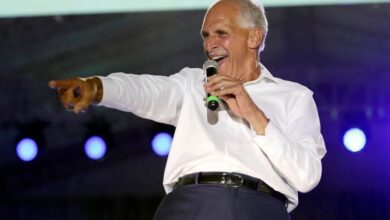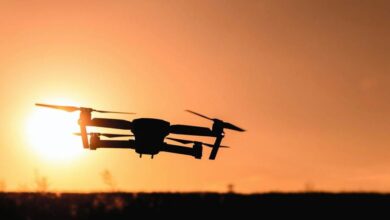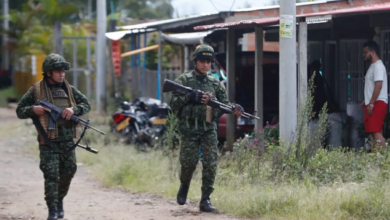Latin American Post spoke with Albenis Tique, a Colombian indigenous leader and member of the ethnic commission for peace.

LatinAmerican Post spoke with Albeniz Tique, one of the most relevant faces in the Colombian indigenous movement. Photo: TW-comisionetnica
LatiAmerican Post | Santiago Gómez Hernández
Escucha este artículo
Leer en español: “Toda Colombia ve con absoluta desesperanza este momento electoral”: lideresa indígena
In the middle of the pre-electoral panorama in Colombia, various social movements are seeking to find visibility in their struggles and claims. The indigenous community is one of the most historically forgotten communities in Colombia. However, thanks to the latest national protests and their participation in the National Strike in the first semester of 2021, their voices are increasingly being heard. Latin American Post spoke with Albenis Tique, one of the most relevant faces in the Colombian indigenous movement.
Latin American Post: Five years after the signing of the Peace Agreement in Havana, how do the indigenous communities see the fulfillment of the agreement?
Albernis Tique: I see an outdated implementation. We from the Ethnic Commission for Peace and the Defense of Territorial Rights have followed up on the Government's reports, we see statistics and we want them to tell us where those land figures that have been awarded to women come from. One thing is compliance and another is the duty of what corresponds to the State. Very cleverly they add up everything over the years and deliver big reports. There really isn't an implementation, but we recognize that there has been some small progress, there has been some dialogue.
In this country, it is thought that politics is what has to do with candidates, but politics is something else. It is the politics of life and nobody likes to hear this. The other is the politicking of large families who want to maintain power.
LP: In recent times, we have seen a greater role for indigenous communities in national movements such as the National Strike. What is the reason for this moment of union with different sectors of urban or peasant society?
AT: I think we have to look back to the 70s and 80s when the indigenous movement became known. Our elders have fought to recover the territory, especially in Cauca. There are 115 peoples, each with different dynamics, geography, and origins, but all suffering the advance of a system quite alien to the realities of our territory. At that time the indigenous movement was born together with the peasant and student movement. There was a march of governors that began by walking from Nariño and entering all the universities in all the cities where the Panamericana passed to tell the people what the movement of indigenous authorities was, why the land was recovering because the big problem was the earthwork. Meeting points were shown us in our struggle.
Later we divided many, but with bridges of communication with the black people that are increased by the way the Government acts. For example, they assigned territory to a community council, and that same territory was assigned to a reservation. So when the black or indigenous brothers arrived, there was already an owner, and that generated confrontations and deaths.
We have not only been exposed to murder, ethnocide, and genocide. They not only kill with a dark force, but with laws. That made us meet again, and we owe a great debt to young people. The 2019 strike was led by young people, the unions made their screen, but young people were the real protagonists.
Also read: National Strike and Pandemic: the Two 'Achilles Heels' Of Iván Duque
The Government realized that it was not the same people who bowed their heads. Then the pandemic came and if they wanted to stop us, do not think they succeeded, it is not to challenge them, but they will not be able to silence us, there is a force, a nuisance, and a Government that does not want to listen.
LP: There may be many, but what do you think are the main demands that indigenous communities have with the Government? What results have you achieved through your struggles and which ones still remain unaddressed?
AT: The recognition that they don't see us as beasts but as human beings. For them, we do not have a soul and that is written in history. It is enough to see that in the 19th century some families from Cauca played sports with us. They used fierce dogs, and in a bullring, they brought out indigenous brothers and enjoyed how the dogs destroyed them. We have won legal recognition because we have our legitimacy, our origin is here in our lands. We talked about the higher law, that we were the first. We had an order, it was not the best or perfect, but it was a balance. Now we have won to be recognized as human beings, we are included in some legal tools such as Convention 169 in the Human Rights Declarations, but this was never the will of the US or Colombian governments, but the fruits of our fights.
Now the problem is the territory, the government calls it land. The government's policy is: the soil for us and the subsoil is for them, but not because they love it, but because there is oil, precious stones, metals to loot. All those characters who have interests in the land return to the problem of agrarian reform, which has never been a real one, nor will the Government allow it because their interests are bigger than ours.
LP: Do you look forward to the next legislative and presidential elections in the country?
AT: All of Colombia looks at this electoral moment with absolute despair. People no longer believe in left or right or top-down or middle. We have all lacked, there has been no one who measures up. However, there is hope and surely he will not win, her name is Francia Márquez. I say this because it is my historical duty. I am not black, I am indigenous, but I have distinguished the Francia project for many years, and I know that it is not perfect, as nobody is perfect, but it is clear to him and the black people have come together (for the most part). I believe that Francia is a hope to be building the way to a real change, but I believe that it will not be soon either.





